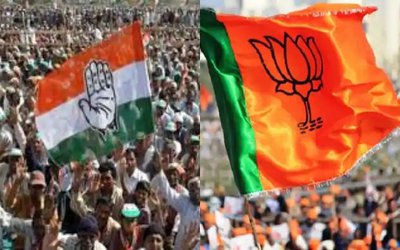
Capex to rise 33% to 10 trillion rupees in 2023/24
Govt targets gross borrowing of 15.43 trillion rupees
Eyes fiscal deficit of 5.9% in 2023/24, 4.5% by 2025/26
India announced on Wednesday one of its biggest ever increases in capital spending for the next fiscal year to create jobs but targeted a narrower fiscal deficit in its last full budget ahead of a parliamentary election due in 2024.
Prime Minister Narendra Modi's party has been under pressure to create jobs in the populous country where many have struggled to find employment, although the economy is now one of the world's fastest-growing.
"After a subdued period of the pandemic, private investments are growing again," Finance Minister Nirmala Sitharaman said as she presented the 2023/24 budget in parliament.
"The budget makes the need once again to ramp up the virtuous cycle of investment and job creation. Capital investment is being increased steeply for the third year in a row by 33% to 10 trillion rupees."
The capital spending increase to about $122.3 billion, which would amount to 3.3% of gross domestic product (GDP), will be the biggest such jump after an increase of more than 37% between 2020/21 and 2021/22.
Total spending will rise 7.5% to 45.03 trillion rupees ($549.51 billion) in the next fiscal year starting on April 1.
Sitharaman said the government would target a fiscal deficit of 5.9% of GDP for 2023/24 compared with 6.4% for the current fiscal year and slightly lower than a Reuters poll of 6%. The aim is to lower the deficit to 4.5% by 2025/26.
In the event, the government has presented a good budget. It has pushed for growth via public capex and continued on the path towards fiscal consolidation, without offering much in terms of outright populism."
Capital Economics said the "absence of a fiscal blowout", a recent drop in inflation and signs of moderating growth could convince India's central bank to slow the pace of rate hikes next week.
It said there was still a chance of fiscal slippage as campaigning kicks off for the election, in which Modi is widely projected to win a third straight term.
The finance ministry's annual Economic Survey, released on Tuesday, forecast the economy could grow 6% to 6.8% next fiscal year, down from 7% projected for the current year, while warning about the impact of cooling global demand on exports.
Sitharaman said India's economy was "on the right track, and despite a time of challenges, heading towards a bright future".
Her deficit plan will be aided by a 28% cut in subsidies on food, fertiliser and petroleum for the next fiscal year at 3.75 trillion rupees. The government cut spending on a key rural jobs guarantee programme to 600 billion rupees - the smallest in more than five years - from 894 billion rupees for this fiscal year.
CONSTRAINTS
Moody's Investors Service said the narrower fiscal deficit projection pointed to the government's commitment to longer-term fiscal sustainability, but that a "high debt burden and weak debt affordability remain key constraints that offset India's fundamental strengths".
Among other moves to stimulate consumption, the surcharge on annual income above 50 million rupees was cut to 25% from 37%.
Indian shares reversed earlier gains to close lower on Wednesday, led by a fall in insurance companies after the budget proposed to limit tax exemptions for insurance proceeds, while Adani Group shares tumbled again as it struggles to repel concerns raised by a U.S. short seller.
Since taking office in 2014, Modi has ramped up capital spending including on roads and energy, while wooing investors through lower tax rates and labour reforms, and offering subsidies to poor households to clinch their political support.
A lack of jobs for young people, and meagre wages for those who do find work, has been one of the main criticisms of Modi.
Sitharaman also said the government was allocating 350 billion rupees for energy transition, as Modi focuses on green hydrogen and other cleaner fuels to meet India's climate goals.
Source: Reuters
- Japan-US Trade Meeting Concluded In Washington
- Apr 18, 2025
- 'No Rush' To Reach Trade Deals: Trump:
- Apr 18, 2025
- China will stand with Asian peers to stop 'abuse of tariffs': Xi
- Apr 17, 2025
- Japan-US Trade Meeting Held In Washington
- Apr 17, 2025
- China targets Boeing as tariff tensions grow : US Media:
- Apr 16, 2025















